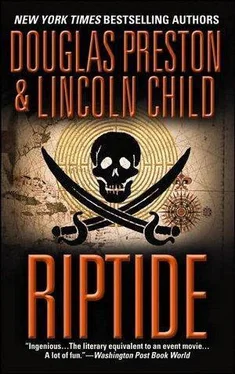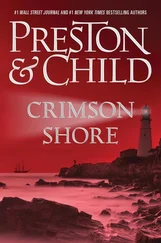Douglas Preston - Riptide
Здесь есть возможность читать онлайн «Douglas Preston - Riptide» весь текст электронной книги совершенно бесплатно (целиком полную версию без сокращений). В некоторых случаях можно слушать аудио, скачать через торрент в формате fb2 и присутствует краткое содержание. Жанр: Триллер, на английском языке. Описание произведения, (предисловие) а так же отзывы посетителей доступны на портале библиотеки ЛибКат.
- Название:Riptide
- Автор:
- Жанр:
- Год:неизвестен
- ISBN:нет данных
- Рейтинг книги:3 / 5. Голосов: 1
-
Избранное:Добавить в избранное
- Отзывы:
-
Ваша оценка:
- 60
- 1
- 2
- 3
- 4
- 5
Riptide: краткое содержание, описание и аннотация
Предлагаем к чтению аннотацию, описание, краткое содержание или предисловие (зависит от того, что написал сам автор книги «Riptide»). Если вы не нашли необходимую информацию о книге — напишите в комментариях, мы постараемся отыскать её.
Riptide — читать онлайн бесплатно полную книгу (весь текст) целиком
Ниже представлен текст книги, разбитый по страницам. Система сохранения места последней прочитанной страницы, позволяет с удобством читать онлайн бесплатно книгу «Riptide», без необходимости каждый раз заново искать на чём Вы остановились. Поставьте закладку, и сможете в любой момент перейти на страницу, на которой закончили чтение.
Интервал:
Закладка:
"Seen the paper, Malin?" Bill Banns interrupted Hatch's thoughts with his characteristic lazy drawl. As a young man, Banns had seen The Front Page at the local cinema. Ever since, his views of what a newsman should look like had never altered. His sleeves were always rolled, even on the coldest day, and he'd worn a green visor so long that today his forehead seemed lonely without it.
"No, I haven't," Hatch replied. "I didn't know it was out."
"Just this morning," Banns answered. "Yup, think you'll like it. Wrote the lead article myself. With your help, of course." He touched a finger to his nose, as if to say, you keep me in the pipeline, and I'll keep the good words flowing. Hatch made a mental note to stop by the Superette that evening for a copy.
Various instruments for lobster dissection lay on the table: hammers, crackers, and wooden mallets, all slick with lobster gore. Two great bowls in the center were heaped with broken shells and split carapaces. Everyone was pounding, cracking, and eating. Glancing around the pavilion, Hatch could see that Wopner had somehow ended up at the table with the workers from the local Lobsterman's Co-op. He could just catch Wopner's abrasive voice drifting on the wind. "Did you know," the cryptanalyst was saying, "that, biologically speaking, lobsters are basically insects? When you really get down to it, they're big red underwater cockroaches...."
Hatch turned away and took another generous pull on his beer. This was turning out to be bearable, after all; perhaps more than bearable. He was sure that everyone in town knew his story, word for word. Yet—perhaps out of politeness, perhaps out of pure rural bashfulness—not a word had been said. For that, he was grateful.
He looked across the crowd, scanning for familiar faces. He saw Christopher St. John, sandwiched at a table between two overweight locals, apparently contemplating how to dismantle his lobster while making the least degree of mess. Hatch's eyes roved farther, and he picked out Kai Estenson, proprietor of the hardware store, and Tyra Thompson, commandant of the Free Library, not looking a day older than when she used to shoo him and Johnny out of the building for telling jokes and giggling too loudly. Guess it's true what they say about vinegar being a preservative, he thought. Then, in a flash of recognition, he saw the white head and stooped shoulders of Dr. Horn, his old biology teacher, standing on the outskirts of the pavilion as if not deigning to soil his hands with lobster ruin. Dr. Horn, who'd graded him more toughly than any graduate school professor ever did; who told him he'd seen roadkill that was better dissected than the frogs Hatch worked on. The intimidating, yet fiercely supportive Dr. Horn, who more than any other person had fired Hatch's interest in science and medicine. Hatch was surprised and relieved to see him still among the living.
Looking away, Hatch turned toward Bud, who was sucking lobster meat out of a leg. "Tell me about Woody Clay," Hatch said.
Bud tossed the leg into the nearest bowl. "Reverend Clay? He's the minister. Used to be a hippie, I hear."
"Where'd he come from?" asked Hatch.
"Somewhere down around Boston. Came up here twenty years ago to do some preaching, decided to stay. They say he gave away a big inheritance when he took the cloth."
Bud sliced open the tail with an expert hand and extracted it in one piece. There was a hesitant note in his voice that puzzled Hatch.
"Why'd he stay?" Hatch asked.
"Oh, liked the place, prob'ly. You know how it goes." Bud fell silent as he polished off the tail.
Hatch glanced over at Clay, who was no longer talking to Streeter. As he examined the intense face curiously, the man suddenly looked up and met his gaze. Hatch looked away awkwardly, turning back toward Bud Rowell, only to find that the grocer had gone off in search of more lobster. Out of the corner of his eye he could see the minister rise from the table and approach.
"Malin Hatch?" the man said, extending his hand. "I'm Reverend Clay."
"Nice to meet you, Reverend." Hatch stood up and took the cold, tentative hand.
Clay hesitated a moment, then gestured at the empty chair. "May I?"
"If Bud doesn't mind, I don't," Hatch said.
The minister awkwardly eased his angular frame into the small chair, his bony knees sticking up almost to the level of the table, and turned a pair of large, intense eyes on Hatch.
"I've seen all the activity out at Ragged Island," he began in a low voice. "I've heard it, too. Banging and clanging, by night as well as by day."
"Guess we're a little like the post office," Hatch said, trying to sound lighthearted, uncertain of where this was heading. "We never sleep."
If Clay was amused, he didn't show it. "This operation must be costing somebody a good deal," he said, raising his eyebrows to make it a question.
"We've got investors," Hatch said.
"Investors," Clay repeated. "That's when somebody gives you ten dollars and hopes you'll give back twenty."
"You could put it that way."
Clay nodded. "My father loved money, too. Not that it made him a happier man, or prolonged his life by even an hour. When he died, I inherited his stocks and bonds. The accountant called it a portfolio. When I got to looking into it, I found tobacco companies, mining companies tearing open whole mountains, timber companies that were clear-cutting virgin forests."
As he spoke, his eyes never strayed from Hatch's. "I see," Hatch said at last.
"Here my father had given money to these people, hoping they'd give back twice as much. And that's just what had happened. They'd given back two, three, or four times more. And now all these immoral gains were mine."
Hatch nodded.
Clay lowered his head and his voice. "May I ask how much wealth, exactly, you and your investors hope to gain from all this?"
Something in the way the minister pronounced wealth made Hatch more wary. But to refuse to answer the question would be a mistake. "Let's just say it's well into seven figures," he replied.
Clay nodded slowly. "I'm a direct man," he began. "And I'm not good at small talk. I never learned how to say things gracefully, so I just say them the best way I can. I don't like this treasure hunt."
"I'm sorry to hear that," Hatch replied.
Clay blinked back at him intently. "I don't like all these people coming into our town and throwing their money around."
From the beginning, Hatch had steeled himself against the possibility of such a response. Now that he was hearing it at last, he felt strangely relaxed. "I'm not sure that the other townspeople share your disdain of money," he said evenly. "Many of these people have been poor all their lives. They didn't have the luxury of choosing poverty, as you did."
Clay's face tightened, and Hatch could see he'd hit a nerve. "Money isn't the panacea people think it is," the minister continued. "You know that as well as I. These people have their dignity. Money will ruin this town. It'll spoil the lobstering, spoil the tranquility, spoil everything. And the poorest people won't see any of that money, anyway. They'll be pushed out by development. By progress."
Hatch did not reply. On one level, he understood what Clay was saying. It would be a tragedy if Stormhaven turned into another overdeveloped, overpriced summer playground like Booth-bay Harbor, down the coast. But that didn't seem likely, whether or not Thalassa succeeded.
"There's not much I can say," Hatch said. "The operation will be over in a matter of weeks."
"How long it takes isn't the point," Clay said, a strident note entering his voice. "The point is the motivation behind it. This treasure hunt is about greed—pure, naked greed. Already, a man lost his legs. No good will come of this. That island is a bad place, cursed, if you care to call it that. I'm not superstitious, but God has a way of punishing those with impure motives."
Читать дальшеИнтервал:
Закладка:
Похожие книги на «Riptide»
Представляем Вашему вниманию похожие книги на «Riptide» списком для выбора. Мы отобрали схожую по названию и смыслу литературу в надежде предоставить читателям больше вариантов отыскать новые, интересные, ещё непрочитанные произведения.
Обсуждение, отзывы о книге «Riptide» и просто собственные мнения читателей. Оставьте ваши комментарии, напишите, что Вы думаете о произведении, его смысле или главных героях. Укажите что конкретно понравилось, а что нет, и почему Вы так считаете.












